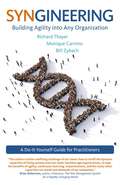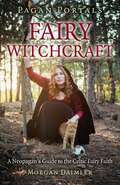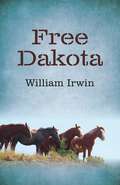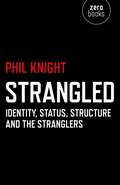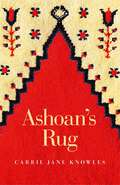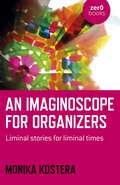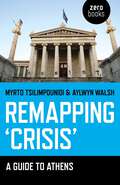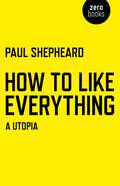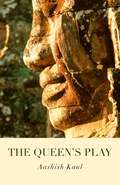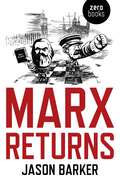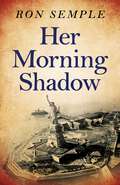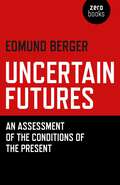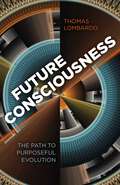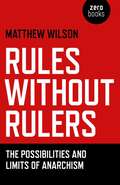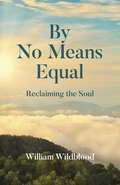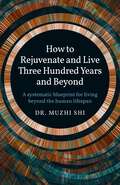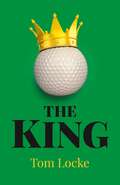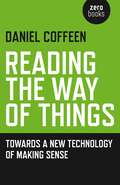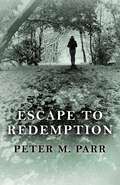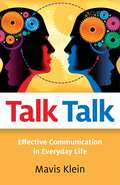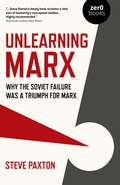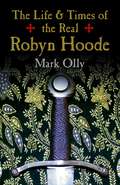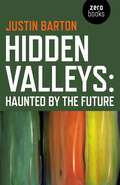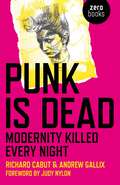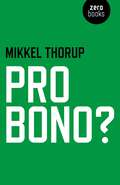- Table View
- List View
Syngineering: A Do-It-Yourself Guide for Practitioners
by Richard Evan Thayer'Whether you are leading, sponsoring, or participating in corporate change, Syngineering can help you understand the specifics of your organization&’s circumstances and determine the right approach to build in agility. Chocked full of practical tools with solid guidance throughout. From the common-sense idea of using the organizations&’ own language to the critical relationship between culture and design, as the 4 detailed approaches for change for each of 4 generic cultures found around the world, sets this book apart from others.' Naomi Stanford, Author of Organization Design: The Practitioner&’s GuideA New Comprehensive Framework for Building Agile Practices into Any Organization Regardless of Its Culture. In the disruptive volatility and complexity of today&’s business world, yesterday&’s problem-solving is no longer adequate. Organizations must have agility: people and process capabilities that can respond quickly to shifts in the external world. Syngineering, the term the authors have coined for how to meet this challenge, combines the best aspects of human dynamics, organization design, and the applications of technology. It replaces expert problem-solving with &‘design thinking&’ and several other agile practices where employees collaborate in questioning, experimenting, and learning what&’s needed as they develop meaningful and sustainable solutions. The book provides a framework and processes that can analyze the current environment and deliver the most effective design and change approach to fit the desired strategy and culture. Case studies from three different culture changes bring the methods to life. This practical and hands-on guide is for anyone working to improve organizational agility and performance. Gain agility, align and thrive.
Pagan Portals - Fairy Witchcraft: A Neopagan's Guide to the Celtic Fairy Faith
by Morgan DaimlerMany neopagans today are drawn to honor the fairies but find that the modern-day path to Fairy is hidden in mist and shadow. Yet the path is still there, waiting for those who are ready to seek it out. This is a guidebook for those seeking a path that combines modern neopagan witchcraft with the older Celtic Fairy Faith. Topics include basic beliefs and practices, holidays, tools, altar set up, and theology, with the intent of giving the seeker a solid grounding in the basics of modern Fairy Witchcraft.
Free Dakota
by William IrwinDon Jenkins wants a divorce from the United States. He&’s tired of a government that can't balance its budget but thinks it can dictate how much soda he should drink. Combining political intrigue and political theory, Free Dakota explores the new possibilities when Don follows the call of a charismatic diner owner who promises a libertarian paradise on the prairie. After years of struggle they have the votes for a peaceful secession, but the feds say it's 'til death do us part. Stopping the feds may cost more in integrity than in blood, however, when Don has to decide whether to stay after an assassination changes everything.
Strangled: Identity, Status, Structure and The Stranglers
by Phil KnightThe Stranglers occupy a paradoxical position within the history of popular music. Although major artists within the punk and new-wave movements, their contribution to those genres has been effectively quarantined by subsequent critical and historical analyses. They are somehow "outside" the realm of what responsible accounts of the period consider to be worthy of chronicling. Why is this so? Certainly The Stranglers' seedy and intimidating demeanor, and well-deserved reputation for misogyny and violence, offer a superficial explanation for their cultural excommunication. However, this landmark work suggests that the unsettling aura that permeated the group and their music had much more profound origins; ones that continue to have disturbing implications even today. The Stranglers, it argues, continue to be marginalised because, whether by accident or design, they brought to the fore the underlying issues of identity, status and structure that must by necessity be hidden from society's conscious awareness. For this, they would not be forgiven.
Ashoan's Rug
by Carrie Jane KnowlesAs it passes from owner to owner, Ashoan's Rug tells the story of how the work of art is not in the creating, but in how the artwork changes lives. A literary magic carpet ride!
An Imaginoscope for Organizers: Liminal Stories for Liminal Times
by Monika KosteraAn Imaginoscope for Organizers offers practical exercises to use both individual and collective imagination to activate and mobilize creative organizing impulses. It proposes intellectual, symbolic and poetic food for thought and practice. Each chapter is a step on the quest for creative ideas and practices and introduces a language that can be used to invent and communicate your own.
Remapping 'Crisis': A Guide to Athens
by Myrto Tsilimpounidi Aylwyn WalshIn periods of intense crisis the pressing need to take sides comes to the surface and trumps neutrality. The claim to objectivity, always a little problematic, can no longer be sustained, and becomes itself a ground of confrontation as the conflicts amongst economists and constitutional lawyers show. As the world is moving towards a state of permanent crisis the engaged intellectual and the committed media are coming back (Costas Douzinas, Professor of Law and Contributor to The Guardian). This is a crucial collection that provides a new perspective on the social dimension of crisis - exemplified in the new wave of social mobilization gaining ground across the globe. The collection is an invigorating addition to the market of ideas circulating at this time of uncertainty, austerity and social change. It is an important and timely contribution to the study of social movements and the rise of direct civil action in pursuit of democracy. In this milieu of social change, Athens is its muse. This book is one of the first collections of chapters devoted to the specificities of Greece&’s crisis in English that does not focus solely on economics. Its scope and intention aligns it with other recently published books on the &‘Arab Spring&’ and the &‘Occupy&’ movements, although its register moves away from journalistic commentary to academic considerations of futurity and the potential of the city to reinvent itself. This makes it a unique interdisciplinary project with a broad appeal.
How To Like Everything: A Utopia
by Paul ShepheardHow To Like Everything is a utopia. "Utopia" is a word invented five hundred years ago at the start of the modern age as a description of the ideal society. It's composed of Latin parts that taken together mean "no place" or "nowhere". We now use the word utopia to mean an impossible dream of perfection. How To Like Everything recasts the actual world, the forever-changing world we live in, as utopia: to make the impossible possible. This is not a dry academic debate. Paul Shepheard takes on his subject by threading questions, evidence and logic through hilarious, moving and thought-provoking stories. The action is set in the complicated city of Amsterdam, where he gets stuck in the briars of love affairs, existential decisions and conflicts with complete strangers. And the philosophy? He is a materialist. His utopia hinges on the question of whether there can be anything other than the present moment.
The Queen's Play
by Aashish KaulIn the second age of the world, a time of prehistory, a time of myth, Mandodari, queen of the demon king Ravana, invents chess to carve out a role for herself in a world where male, martial virtues are paramount. As a chess player, she can play at warfare; as queen, she can be the most potent warrior on the battlefield. The Queen's Play attempts to write the origin of chess into the narrative cycles of the Ramayana, one of the two formative epics of ancient India.The cursory mention of a chess-like game in the Ramayana lore offers interesting parallels and openings between the game and the themes of the epic poem. At the centre of it is a queen, first entering and then growing from strength to strength to become the most powerful piece on the board, inventing a game which closely parallels the epic battle taking place not far from the royal palace, a battle which she is not permitted to join, a battle where she will lose her king. Foregrounding certain episodes from the vast tapestry of the epic, the novel develops new narrative variations that feed back into the classical text with freshly imagined material.
Marx Returns
by Jason BarkerKarl Marx is a revolutionary. He is not alone. It is November 1849 and London is full of them: a bunch of fanatical dreamers trying to change the world. Persecuted by a tyrannical housekeeper and ignored by his sexually liberated wife, Marx immerses himself in his writing, believing that his book on capital is the surest way of ushering in the workers&’ revolution and his family out of poverty. But when a mysterious figure begins to take an obsessive interest in his work Marx&’s revolutionary journey takes an unexpected turn... Marx Returns combines historical fiction, psychological mystery, philosophy, differential calculus and extracts from Marx and Engels's collected works to reimagine the life and times of one of history's most exceptional minds, in this next fiction offering from Zero Books.
Her Morning Shadow
by Ron SempleWar and chaos are no match for an American immigrant bent on keeping a promise... Sequel to the award-winning Black Tom: Terror on the Hudson, Her Morning Shadow tells of a young Jewish Ukrainian immigrant, caught up in the aftershock of World War One. Private 'Abie' Ashansky is trying to build a new life in his adopted home in Jersey City, while searching for his missing fiancée. Spanning continents and relationships, this extraordinary account of one man's journey reveals a community where family is defined not only by blood but by the values and roots on which it is built. 'Buckle down for a wild saga in history that starts in the Great War and charges through the three-way battle for the Crimea and the Ukraine to reach its beacon, the torch of Liberty. A superb alloy of genuine history and vivid imagination.' Leslie Wilbur, Emeritus Professor, University of Southern California.
Uncertain Futures: An Assessment Of The Conditions Of The Present
by Edmund BergerUncertain Futures: An Assessment of the Conditions of the Present provides a detailed look into the economic and political conditions of our present moment from a Marxist perspective. Key aspects of Marxist economic theory are illustrated in clear ways in order to provide an easy introduction to Marxist thought and their applicability. The book also examines the sluggish recovery from the Great Recession, in the context of the long-term feasibility of sustaining the capitalist system by placing it into a historical framework. It considers the necessity of social democratic reforms while calling for an anarchic re-invigoration of the politics of everyday life.
Future Consciousness: The Path to Purposeful Evolution
by Thomas LombardoHow do our unique conscious minds reflect and amplify nature&’s vast evolutionary process? This book provides a scientifically informed, psychologically holistic approach to understanding and enhancing our future consciousness, serving as a guide for creating a realistic, constructive, and ethical future. Thomas Lombardo reveals how we can flourish in the flow of evolution and create a prosperous future for ourselves, human society and the planet.
Rules Without Rulers: The Possibilities and Limits of Anarchism
by Matthew WilsonThis book is about the possibility of organising society without the state, but, crucially, it makes the claim, contrary to much anarchist theory, that such a life would not entail absolute freedom; rather, as the title suggests, it would mean creating new forms of social organisation which, whilst offering more freedom than state-capitalism, would nonetheless still entail certain limits to freedom. In making this argument, a secondary point is made, which highlights the book&’s originality; namely, that, whilst anarchism is defended by an increasing number of radicals, the reality of what an anarchist society might look like, and the problems that such a society might encounter, are rarely discussed or acknowledged, either in academic or activist writings.
By No Means Equal: Reclaiming the Soul
by William WildbloodThis is the age of equality, which this book argues directly opposes the idea of the individual soul as a spiritual reality. Equality is the rock on which our modern Western liberal democracies are built. When we talk of Western values, this is the one that underlies the rest. But what if this rock is made of sand? By No Means Equal explores the idea of equality and suggests it is an ideological belief with no foundation in reality. It may seem a progressive belief from the political point of view, but in reality, its acceptance is spiritually damaging, with consequences for the evolution of the soul.
How to Rejuvenate and Live Three Hundred Years and Beyond: A Systematic Blueprint for Living Beyond the Human Lifespan
by Muzhi ShiIs it possible to live forever? Is immortality within reach of science and scientific breakthroughs? In How to Rejuvenate and Live Three Hundred Years and Beyond, world-class scientist Dr. Muzhi Shi discloses through philosophical discourse his systematic blueprint for living beyond today's human lifespan, illustrating the great potential of state-of-the-art technologies from an insider's perspective. Dr. Shi evaluates current technologies to select essential tools for such a grand goal and offers a unique view of trendy dietary supplements, longevity pills and other biotechnologies - and, most importantly, he answers some of the essential questions about life and death that everyone is curious about.
The King
by Tom LockeMeet Vince Kingmyle, fantasist, philistine, entrepreneur, misogynist and golf bore. Vince runs a company promoting golf tourism in Edinburgh and has big plans, at least in his own mind, to which end he enlists the help of an old work colleague, Sean Monaghan, to build up his IT system. Sean is diffident and cultured, and suffers Vince for the money, but when new recruit Lucy appears on the scene and they uncover Vince's secrets, he finally decides enough is enough. Brimming with humour and mischief, The King will keep you turning pages with a smile right to the very end.
Reading the Way of Things: Towards a New Technology of Making Sense
by Daniel CoffeenA Deleuzian guide to reading the world, Reading the Way of Things is an exploration of the ideas of McLuhan, Deleuze, Guattari, Merleau-Ponty, Foucault, Burroughs, and more. It is a book that aims at getting the reader past teleological interpretations and questions, letting the reader in on new ways of doing criticism as well as new ways of going, being, and thinking.
Escape To Redemption
by Peter M. ParrJosie only had the gun to frighten Curtis Rook, but his son disturbed her. One startled reflex and now he's dead. Josie flees to Poland leaving her boyfriend Snaz to take the rap. A reformed criminal offers her refuge from the police and the chance to begin a new life, but she cannot hide from her guilt. As the stakes rise, Josie begins to realise that only her own forgiveness can set her free. Fast-paced and original, Peter M. Parr's contemporary take on Crime and Punishment challenges traditional ideas about guilt and redemption, and the meaning of forgiveness.
Talk Talk: Effective Communication in Everyday Life
by Mavis KleinUsing the easily understood vocabulary of Transactional Analysis and her own original contribution to the theory, Mavis Klein presents a handbook that will vividly illuminate and clarify all the issues that arise in our everyday communications. While the aim of this book is primarily to overcome problems in people's working lives - with line managers, subordinates, and peer group colleagues, it provides stunning insight into all that takes place when we talk to others - from a time-passing chat to a stranger at a bus stop to the most profound conversations with intimate others in our lives.
Unlearning Marx: Why the Soviet Failure was a Triumph for Marx
by Steve PaxtonThe theories of Karl Marx and the practical existence of the Soviet Union are inseparable in the public imagination, but for all the wrong reasons. This book provides detailed analyses of both Marx&’s theory of history and the course of Russian and Soviet development and delivers a new and insightful approach to the relationship between the two. Most analyses of the Soviet Union, from any perspective, focus on trying to explain the failure to establish socialism, giving too much weight to the political pronouncements of the regime. But, for Marx, this approach to historical explanation is back-to-front, it's the political tail wagging the economic dog. When we move our focus from the stated aims of building socialism, and look at what actually happened in Russia from emancipation in the 1860s, through the Soviet era to the 1990s, we can clearly see the patterns which Marx identified as the essential features of the transition from feudalism to capitalism in England from the sixteenth century to the nineteenth. As such, the Soviet experiment forms an important part of Russia&’s transition from feudalism to capitalism and provides an excellent example of the underlying forces at play in the course of historical development. Unlearning Marx will surprise Marx&’s admirers and his detractors alike, and not only shed new light on Marxism's relationship with the Soviet Union, but on his ongoing relationship with our world.
The Life & Times of the Real Robyn Hoode
by Mark OllyAn utterly unique history book that attempts to chronicle the life & times of the real Robyn Hoode from the perspective of a genuine historical character & in the form of a complete journal of his life, & the lives of those around him. The result is possibly the most complete genuine framework for the investigation & discovery of a character that represents heroic resistance to powerful & corrupt authority the world over, but who appears here as a solitary mortal man with all his human failings. Utterly relevant to modern archaeological & historical investigation, this voyage of discovery reveals hidden mysteries of the true power of the north at the time of the founding of democracy through Magna Carta 800 years ago & includes a gazetteer of sites to visit & all the latest discoveries.
Hidden Valleys: Haunted by the Future
by Justin BartonThe future is alongside us, sometimes closer, sometimes further away. Hidden Valleys starts from the perception that the human world is an eerie place, particularly in relation to its stories and dreams. It also starts from events that took place in North Yorkshire, in 1978. A work of philosophy, an account of experiences, and a biography of a year, it is simultaneously a challenging cultural analysis, drawing on novels, songs and films. It argues for lucidity over reason, becomings over conventional gender and familialism, groups over state politics, and for an escape to wider realities in place of the delusions of religion. Most centrally it breaks open a view of a futural dimension that coexists with the present, and which intrinsically involves a heightened awareness and evaluation of the planet, of women, and of the abstract. Inseparably it is also a detective investigation into the causes of the eerie human predicament. The book reaches the planetary by starting from a singular place, it reaches reality by starting from dreams, and it reaches the future by finding a doorway in the past.
Punk Is Dead: Modernity Killed Every Night
by Andrew Gallix Richard CabutThis original collection of insight, analysis and conversation charts the course of punk from its underground origins, when it was an un-formed and utterly alluring near-secret, through its rapid development. Punk is Dead: Modernity Killed Every Night takes in sex, style, politics and philosophy, filtered through punk experience, while believing in the ruins of memory, to explore a past whose essence is always elusive.
Pro Bono?
by Mikkel ThorupPro Bono? discusses philanthropy not as a social or humanitarian practice but as an integrated part of present-day creative capitalism, having a direct relation to its growing inequality. The book investigates four expressions of philanthropy as ideology: consumer philanthropy, where we are asked to consume with good conscience; corporate philanthropy where businesses engage in social work and where philanthropic associations reengineer themselves to mimic corporations; billionaire philanthropy where conspicuous consumption is now being supplemented with conspicuous philanthropy; and finally celebrity philanthropy where now one of the hallmarks of a celebrity is the commitment to use that fame to do good.
